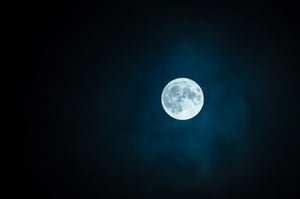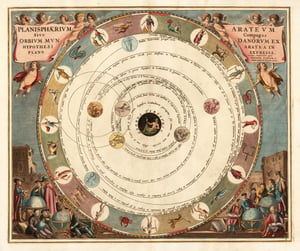A blog post by Melissa Ruisz Nazario based on a webinar presented by Keiron Le Grice, Ph.D.
Astrology is the ancient practice of looking at the relative positions of celestial bodies and their relationship and influence on earth, the natural world, and humans. [1] Depth psychology has to do with psychologies and therapies involving “the exploration of the subtle, unconscious, and transpersonal aspects of human experience.” [2]
.jpg?width=237&name=joel-filipe-191372-unsplash%20(1).jpg) Carl Gustav Jung, pioneer in the field of depth psychology, spent much of his life’s work exploring and describing the dynamic forces in the human psyche—the totality of psychological experience. He called these forces “archetypes”: the different drives, patterns, and powers that impel humans to behave in different ways, often unconsciously.
Carl Gustav Jung, pioneer in the field of depth psychology, spent much of his life’s work exploring and describing the dynamic forces in the human psyche—the totality of psychological experience. He called these forces “archetypes”: the different drives, patterns, and powers that impel humans to behave in different ways, often unconsciously.
“One of the insights of depth psychology, really, is that there’s the dimension of the psyche called the unconscious that can blind us,” says Keiron Le Grice, Chair of the Jungian and Archetypal Studies Specialization at Pacifica Graduate Institute. “It can grab us, it can drive us compulsively and impel us to do something that we wouldn’t consciously, in our better judgment, have chosen.”
So, how are the fields of astrology and depth psychology connected, especially as it seems that, superficially, one looks at “outer space,” while the other appears to explore the “inner space” of the mind?
That is the work of archetypal cosmology, a relatively new field of study rooted in the ancient practice of astrology and informed by depth psychological concepts. Archetypal cosmology posits that the planetary configurations in the solar system reflect the deep order of the psyche. It utilizes astrology to map out the shifting themes and patterns of human experience.
“It uses astrologies, methods of interpreting these patterns formed by the planets as they move on their orbits, it uses that to map the psyche,” says Le Grice. “Astrology can be seen as a kind of archetypal map using an external planetary frame of reference to understand the shifts that are happening within the depth of the psyche. And this can be used to understand cultural changes. It can be used to understand the basic pattern of the human personality.”
Le Grice offers examples such as the sun having to do with the ego, the light of consciousness, and the hero archetype, in the sense that the hero is intentional consciousness, will, and individualism. The moon has much to do with the child archetype as well as the child and great mother relationship, and Saturn is related to the senex, or wise old man, having to do with age, authority, maturity, and death.
Shifting Paradigms
Unlike some practices of astrology that attempt to make specific or literal predictions for individuals' lives, Le Grice says, archetypal cosmology moves far away from any sort of fortune telling. Instead, it’s concerned with understanding major archetypal themes, patterns, and dynamisms that are manifest in human experience.
 What is difficult for many when learning about archetypal cosmology is to grasp how there could actually be a relationship between celestial bodies and human behaviors, feelings, and experiences, and to move beyond the Cartesian/Newtonian mental model that believes in a causal relationship, that these celestial bodies are influencing us and causing a change in the psyche, such as the moon’s gravitational pull causing humans to behave differently. As a basis for astrology, this attempt to explain it causally through forces is easily debunked by scientists, Le Grice says.
What is difficult for many when learning about archetypal cosmology is to grasp how there could actually be a relationship between celestial bodies and human behaviors, feelings, and experiences, and to move beyond the Cartesian/Newtonian mental model that believes in a causal relationship, that these celestial bodies are influencing us and causing a change in the psyche, such as the moon’s gravitational pull causing humans to behave differently. As a basis for astrology, this attempt to explain it causally through forces is easily debunked by scientists, Le Grice says.
“It seems incomprehensible because we’re so used to thinking in kind of Cartesian, causal terms of planets emitting forces that somehow influence us,” says Le Grice. “Jung doesn’t see it that way at all. I think he’s right. He did periodically entertain causal explanations of astrology but, by and large, he favored a synchronistic view, the idea that there’s this acausal connection between where the planets are and what the archetypes are doing within, in the psyche.”
Le Grice also contends that studying astrology as part of an academic discipline is outside the bounds of what most consider acceptable intellectual discourse. “So, this is a radical proposition by most standards and contradicts the assumptions that inform our worldview,” he says. “But if you investigate astrology with any depth, you might come to see and understand this correlation.”
 When we look at everything—humans, nature, the planets, and so on—not as separate objects that encounter and influence each other through forces like gravity, but rather as interconnected, we begin to understand the synchronistic, acausal relationship Jung described. James Hillman, who developed and extended Jung’s view of psychology into archetypal psychology, “emphasizes even more this idea of a world soul, an anima mundi, the idea that archetypes and psyche, soul, pervade everything, that the psyche is not just the inner world in the human mind inside the head,” says Le Grice. “For Hillman, and for Jung too, the psyche is like a field that’s all around us, like an atmosphere, in which we live. And so, it’s within the within of all things, and not just the within of the individual human being.”
When we look at everything—humans, nature, the planets, and so on—not as separate objects that encounter and influence each other through forces like gravity, but rather as interconnected, we begin to understand the synchronistic, acausal relationship Jung described. James Hillman, who developed and extended Jung’s view of psychology into archetypal psychology, “emphasizes even more this idea of a world soul, an anima mundi, the idea that archetypes and psyche, soul, pervade everything, that the psyche is not just the inner world in the human mind inside the head,” says Le Grice. “For Hillman, and for Jung too, the psyche is like a field that’s all around us, like an atmosphere, in which we live. And so, it’s within the within of all things, and not just the within of the individual human being.”
Studying archetypal cosmology also reflects the way in which Jung pushed the boundaries of intellectual thought in his research topics. “Virtually everything that Jung studied, from synchronicity to astrology to alchemy to parapsychology to mysticism, mystical experience, to polytheistic myths, all those things are in some sense, beyond or on the margins of where mainstream academic thought is,” he says.
The Value of Studying Archetypal Cosmology
 "If you can work with astrology, if you can understand by looking at the planetary positions as they move in their orbits," Le Grice says, "then you can understand how the archetypes in the psyche change in relationship to each other." This is important because the more conscious you are of the archetypes, the less likely they will be able to drive you to act compulsively.
"If you can work with astrology, if you can understand by looking at the planetary positions as they move in their orbits," Le Grice says, "then you can understand how the archetypes in the psyche change in relationship to each other." This is important because the more conscious you are of the archetypes, the less likely they will be able to drive you to act compulsively.
An archetypal understanding of astrology can illuminate the deeper patterns and dynamics of human experience on an individual level. “Particularly if you’re involved in individuation, you’re trying to grow psychologically, and you’re going through transformative experiences, astrology can be very valuable because it can illuminate individual experience,” Le Grice says. But it can also illuminate our collective human experience and what is occurring culturally. “We live in very turbulent times, and astrology can help us get some perspective on that: why we find ourselves in such chaos, and to perceive an order behind the chaos. I think that’s a very helpful thing to have in our moment of history.”
Studying archetypal cosmology can also help give the modern individual’s life a greater sense of meaning, Le Grice says, because it can help you feel that your your life is not just arbitrary or random, but rather your individual experience is meaningfully connected to the universe, and that your experience is somehow connected to the whole and connected to all other people’s experience through the archetypes.
 "So I think that astrology can be very helpful at giving that cosmological perspective and allowing us to live with a greater sense of meaning beyond our own experience," says Le Grice. "You know, we’ve all got our own life meaning, we all want to make money or get a comfortable lifestyle, or get married and have children and be happy and so on. These are very valuable, meaningful aims, but sometimes we crave more. And there’s something in the human psyche that longs for connection to a greater order, to the numinous—numinous is a term that Jung used to describe spiritual powers, spiritual experience. And astrology gives us a way to understand the different kinds of numinous powers, the different kinds of archetypes that are coming through us."
"So I think that astrology can be very helpful at giving that cosmological perspective and allowing us to live with a greater sense of meaning beyond our own experience," says Le Grice. "You know, we’ve all got our own life meaning, we all want to make money or get a comfortable lifestyle, or get married and have children and be happy and so on. These are very valuable, meaningful aims, but sometimes we crave more. And there’s something in the human psyche that longs for connection to a greater order, to the numinous—numinous is a term that Jung used to describe spiritual powers, spiritual experience. And astrology gives us a way to understand the different kinds of numinous powers, the different kinds of archetypes that are coming through us."
Intrigued?
If you are intrigued and want to learn about resources and how you can study archetypal cosmology at Pacifica Graduate Institute via the Depth Psychology M.A./Ph.D. Program with Jungian and Archetypal Studies Specialization, stay tuned for Part II of this Archetypal Cosmology blog post series.
[1] https://entertainment.howstuffworks.com/horoscopes-astrology/question749.htm
[2] https://www.cgjungcenter.org/clinical-services/what-is-depth-psychology/
 Melissa
Melissa
 Dr. Keiron Le Grice is a professor of depth psychology and archetypal cosmology. He’s Chair of the Depth Psychology M.A./Ph.D. Program with Jungian and Archetypal Studies Specialization at Pacifica. He teaches courses on archetypes, individuation, alchemy, synchronicity, and the history of depth psychology. He was educated at the University of Leeds England and the California Institute of Integral Studies in San Francisco. He is the author of four books, The Archetypal Cosmos, Discovering Iris, The Rebirth of the Hero, and Archetypal Reflections. He’s co-editor of Jung on Astrology, which is a compilation of Jung’s writings on the topic. He is the founder and former co-editor of Archive, The Journal of Archetypal Cosmology. In 2016, he co-founded The Institute of Transpersonal and Archetypal Studies, and his two-part archetypal astrological analysis of Bruce Springsteen’s song lyrics is housed in the Bruce Springsteen special collection in New Jersey. Recently, he contributed an essay to Jung’s Red Book for Our Times published by Chiron.
Dr. Keiron Le Grice is a professor of depth psychology and archetypal cosmology. He’s Chair of the Depth Psychology M.A./Ph.D. Program with Jungian and Archetypal Studies Specialization at Pacifica. He teaches courses on archetypes, individuation, alchemy, synchronicity, and the history of depth psychology. He was educated at the University of Leeds England and the California Institute of Integral Studies in San Francisco. He is the author of four books, The Archetypal Cosmos, Discovering Iris, The Rebirth of the Hero, and Archetypal Reflections. He’s co-editor of Jung on Astrology, which is a compilation of Jung’s writings on the topic. He is the founder and former co-editor of Archive, The Journal of Archetypal Cosmology. In 2016, he co-founded The Institute of Transpersonal and Archetypal Studies, and his two-part archetypal astrological analysis of Bruce Springsteen’s song lyrics is housed in the Bruce Springsteen special collection in New Jersey. Recently, he contributed an essay to Jung’s Red Book for Our Times published by Chiron.



